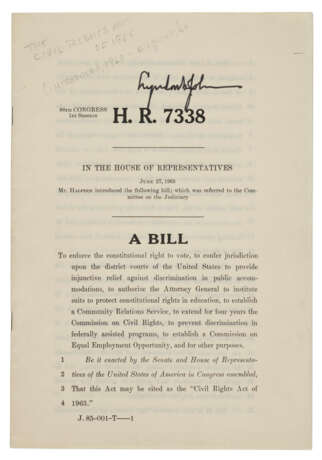ID 887983
Lot 205 | An early draft of the Civil Rights Act of 1964
Valeur estimée
$ 40 000 – 60 000
Octavo (278 x 190mm). Staple bound self wrappers, signed by Lyndon Johnson on the front wrap ("Lyndon B. Johnson"), pencil emendations near upper margin (mild soiling on rear wrapper). Red cloth chemise and matching clamshell.
“We have talked long enough in this country about equal rights. We have talked for one hundred years or more. It is time now to write the next chapter, and to write it in the books of law.” Lyndon Johnson, 27 November 1963
Lyndon Johnson adds his signature on early draft of what would become the Civil Rights Act of 1964—the most sweeping civil rights legislation in U.S. history. First introduced by John F. Kennedy on 13 June 1963 (H.R. 7152) the bill was to be known as "The Civil Rights Act of 1963." Seymour Halpern, a Republican from New York, submitted a companion bill on 27 June 1963 which was referred to the House Judiciary Committee headed by Emanuel Celler, Democrat of New York. Much of the text of the two bills is quite similar, but Halpern's appears to go further and likley helped inform the Judiciary committee's work strengthening the bill overall. In remarks delivered on 30 August 1963, two days after Martin Luther King delivered his "I have a Dream" speech at the steps of the Lincoln Memorial, Halpern spoke before the House to advocate the bill's passage, one he urged "should be passed without any weakening or softening amendments. If anything it should be strengthened. Let me review the chief provisions of the bill for you. In the crucial area of voting rights, the bill would guarantee equal voting rights in Federal elections, abolish discriminatory literacy tests, permit court-appointed voting referees, and speed voting rights suits in Federal courts. Surely, there is nothing more basic in the American way of life than the free and equal right of franchise, and anything that prevents any responsible adult American from exercising that right cannot be tolerated. In order to expedite school desegregation, the bill would provide technical and financial aid to local school authorities engaged 1n such school desegregation, and would authorize court action by the Attorney General to speed up this desegregation. A Community Relations Service would be set up under this bill to help local communities solve racial disputes and ease racial tensions. In view of the various kinds of racial frictions and clashes, actual, and potential, that can be found almost everywhere in these United States, North and South, this service could be most helpful. Certainly the successful experience gained in handling race or color related problems in one area should be utilized wherever applicable in other parts of the country. The bill would prohibit racial discrimination by all Federal contractors and subcontractors. The U.S. Government would be empowered to withhold Federal grants when it finds the funds are being used in a discriminatory way. I would like to see this mandatory and am doing my utmost to strengthen the bill. And finally, there ls the public accommodations provision. This is, of course, the provision that has aroused the most intense publicity in the press and has been argued up and down the land. The bill, as you probably are aware, would guarantee equal access for all to public accommodations, such as hotels, motels, restaurants, stores, and places of public entertainment." (Congressional Record)
After the final version of the bill was reported out of the House Judiciary committee in November 1963, the bill languished in the Rules Committee chaired by Virginia Democrat Howard R. Smith, a staunch segregationist. In the end, it took the assassination of Kennedy and Lyndon Johnson's deep legislative experience to push the bill to passage. On 27 November 1963, Johnson appealed to legislators, "No memorial oration or eulogy could more eloquently honor President Kennedy's memory than the earliest possible passage of the civil rights bill for which he fought so long." With political pressure mounting, Chairman Smith relented and allowed the bill to pass through the rules committee and the bill passed the House. Johnson's next hurdle would be the Senate, where the 18-member strong Southern Bloc mounted a 54-day long filibuster to prevent passage. In the end, supporters offered a substitute bill that was somewhat weaker than the original, but not weakened enough to compel the House to reconsider its own endorsement. That bill managed to secure the 67 votes in the Senate to end debate and secure passage. Lyndon Johnson signed the 1964 Civil Rights Act into law on 2 July 1964.
| Artiste: | Lyndon Baines Johnson (1908 - 1973) |
|---|---|
| Lieu d'origine: | Etats-Unis |
| Catégorie maison de vente aux enchères: | Lettres, documents et manuscrits |
| Artiste: | Lyndon Baines Johnson (1908 - 1973) |
|---|---|
| Lieu d'origine: | Etats-Unis |
| Catégorie maison de vente aux enchères: | Lettres, documents et manuscrits |
| Adresse de l'enchère |
CHRISTIE'S 8 King Street, St. James's SW1Y 6QT London Royaume-Uni | |
|---|---|---|
| Aperçu |
| |
| Téléphone | +44 (0)20 7839 9060 | |
| Commission | see on Website | |
| Conditions d'utilisation | Conditions d'utilisation |




